Americans express highly negative views of elected officials – and have grown increasingly pessimistic about their congressional representatives over the past several years. In fact, views of Congress, congressional leadership, the current and former president, and the vice president are all underwater.
When asked about various aspects of the job those in Congress are doing, such as working with members of the opposing parties or caring about the people they represent, Americans are critical on nearly every domain.
Views of members of Congress
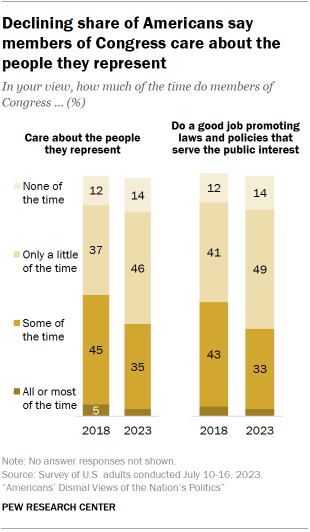
Opinions about Congress are largely negative; just 26% of U.S. adults have a favorable view of Congress, while 72% have an unfavorable view.
Serving the public interest and people in their districts
The public also is critical of how members of Congress do their jobs – and in some cases these criticisms have increased in recent years:
- In 2018, half of adults said members of Congress care about the people they represent all, most or some of the time. Today, 38% say the same. A majority say that members of Congress care about their constituents “only a little” or none of the time.
- There has been a similar decline in the share of adults who say members of Congress do a good job promoting laws and policies that serve the public interest. Five years ago, 47% said congressional members do this at least some of the time. Today, just 36% say that members of Congress promote the public interest.
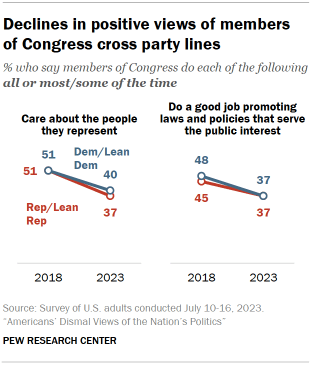
On both evaluations, positive views have declined among Republicans and Democrats alike. About four-in-ten members of both parties say members of Congress care about the people they represent all or most of time. Roughly half said this in 2018.
There have been similar declines in the shares of Republicans and Democrats who say the members do a good job promoting policies that serve the public interest.
Across many dimensions, public rates members of Congress poorly
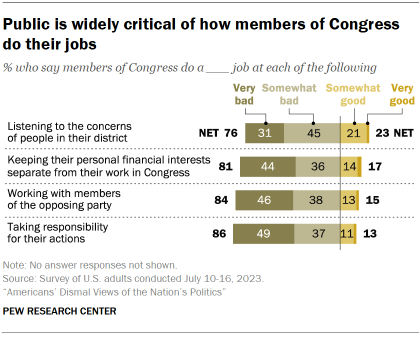
At least three-quarters or more say that members of Congress do a somewhat or very bad job at listening to the concerns of people in their district (76%), keeping their personal financial interests separate from their work in Congress (81%), working with members of the opposing party (84%) and taking responsibility for their actions (86%).
The public is especially negative when it comes to whether members of Congress take responsibility for their actions. Nearly nine-in-ten say congressional members do a bad job taking responsibility – including about half (49%) who say they do a very bad job at this.
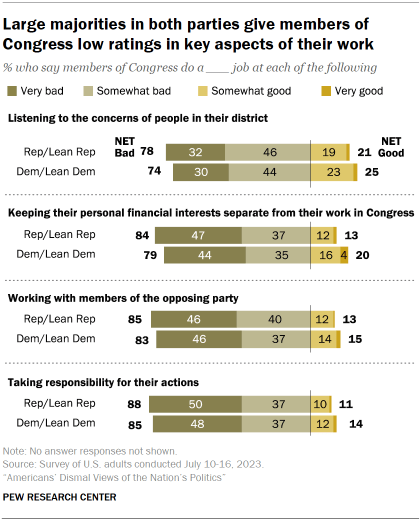
Views across these items are deeply negative among nearly all demographic groups – including by gender, age, race and education.
Assessments of members of Congress differ little by party. Majorities of Republicans and Democrats alike – including those who lean to each party – say that members of Congress do a poor job keeping their personal financial interests separate from their work in Congress (84% of Republicans, 79% of Democrats) or listening to the concerns of people in their district (78% of Republicans, 74% of Democrats).
Similarly, at least eight-in-ten Republicans and Democrats say that members of Congress do a bad job taking responsibility for their actions or working with members of the opposing party.
Age and views of elected officials
For the most part, views of congressional job performance are broadly negative across demographic groups. Yet adults ages 65 and older offer more positive evaluations in some specific areas.
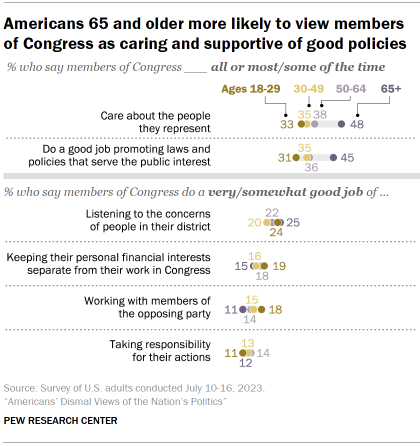
Nearly half of those 65 and older (48%) say members of Congress care about the people they represent at least some of the time. Far fewer adults under 65 say the same – including just a third of those under 30.
While 45% of Americans 65 and older say members of Congress do a good job promoting policies and laws that serve the public interest, this compares with 36% of those ages 50 to 64, 35% of those 30 to 49 and just 31% of adults under 30.
Older adults were slightly more positive on these assessments of Congress than their younger counterparts, but age differences are either small or nonexistent when it comes to the other items asked about on the survey.
In their own words: Americans’ views of the major problems with today’s elected officials
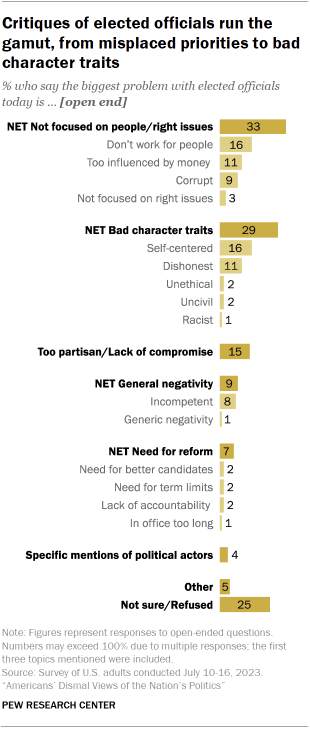
When asked in an open-ended question about the biggest problem with elected officials today, adults point to a variety of issues – ranging from a lack of focus on the people they represent to mentions of negative character traits, general incompetence and the role of partisanship in officials’ ability to get things done.
One recurring theme is a sense that elected officials today are not in touch with the people they represent or do not advocate for the issues that matter to their constituents.
A third of adults express this view, including 11% who feel elected officials are too influenced by money and 9% who say they are corrupt. “Their end goals are personal and not for the betterment of the voters who elected them,” says a man in his 60s.
Another man in his 20s believes elected officials are “too out of touch with the public. They’re too obsessed with money and power, so they don’t care about the people anymore.”
Roughly three-in-ten adults mention negative personal traits of elected officials, saying that elected officials are dishonest or self-centered. One woman in her 60s says they have “no empathy, and are unable to see both sides of the picture … [they’re] not truthful.”
Explore more voices: Americans’ views of their elected officials
What do you see as the biggest problem with elected officials today?
“They bend to whomever can donate most to their campaign and don’t follow through on campaign promises.” –Man, 30s
“Lack of awareness and understanding of today’s political and social landscape. Old politicians with old money don’t understand the issues of today, leading to a huge disconnect with the public’s priorities and theirs.” –Woman, 20s
“Greed. Greed. Greed. Power leads to greed.” –Woman, 70s
“No accountability and they all think they are rockstars.” –Man, 30s
“They are focused on donor money and preventing the ‘other side’ from making advancements instead of governing in a way that helps all constituents.” –Woman, 40s
“Too much ego and not caring enough to listen to us.” –Woman, 50s
“Power hungry. Money hungry. Lazy. Liars.” –Man, 40s
“Many are self-serving, misdirected and too partisan. They have lost common sense, love of country, and have no moral core.” –Woman, 70s
“They do not serve the people, they serve themselves and special interests, and lie to our faces about their priorities.” –Man, 40s
The influence of partisanship is another theme mentioned by 15% of adults. Most Americans who cite issues along this theme point to the inability of elected officials to get things done due to polarization or loyalty to one’s party.
The biggest problem with today’s elected officials, according to one woman in her 50s, is “the idea that what we want is for them to fight for whatever they believe in at all costs, rather than compromise and actually accomplish something. I can’t think of another profession where you can get paid for refusing to do anything.”
“They are not willing to speak to anyone across the aisle,” says another man in his 40s. “It is their party or nothing.”
Many of these themes were echoed in a survey conducted in 2015 – reflecting a persistent skepticism among members of the public that elected officials do not hold office for the betterment of the people they represent, but for the benefit of themselves. Eight years ago, sizable shares of adults said that elected officials were out of touch with people or too influenced by money and special interests.
How much do elected officials care about people like me?
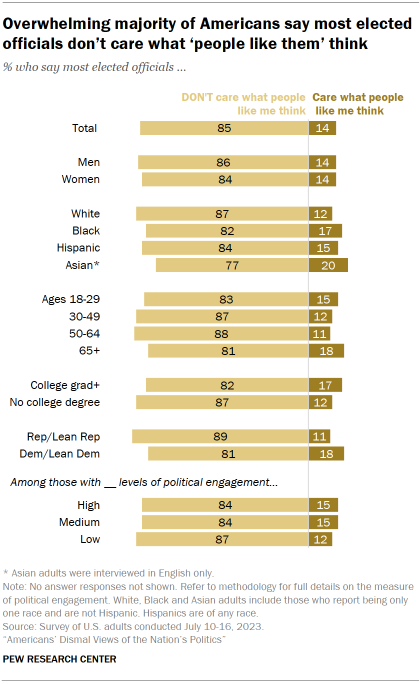
Among U.S. adults overall, 85% say elected officials do not care what people like them think. Just 14% say they do care.
In the early 1990s, about a third of adults said elected officials cared about people like them – a share that declined steadily into the 2010s.
Skepticism that most elected officials care about the public is evident among Americans regardless of gender, race, age, education, partisanship or political engagement. For example, 84% of those who are highly engaged with politics say that elected officials don’t care what people like them think. This compares with 87% of those who are less engaged with politics.




